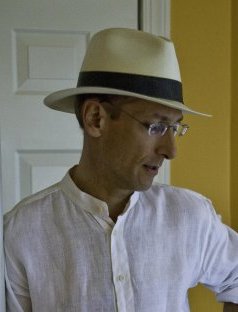
A proposition must fulfill some onerous and complex conditions before it can be admitted within a discipline; before it can be pronouced true or false it must be ... 'within the true.'
Michel Foucault
Jonathan Lyons
I have spent much of my professional and personal life exploring the shifting boundaries between East and West, first on both sides of the Cold War divide and, for the past two decades, on the cusp between the Islamic and Western worlds. Over time, I have come to see the relationships between these seemingly polar fields as a problem not of geography or politics (or even geo-politics) but of thought, ideas, and knowledge – that is, as essential problems of epistemology. Now, I am applying this same insight to the social history of ideas more generally in a new project that poses the question, How do we think about stuff?
My growing engagement with the social bases of knowledge prompted me to leave behind more than 20 years as a foreign correspondent and editor, much of it in the Islamic world, and to complete a doctorate in sociology at Monash University, Melbourne, Australia.
Already, I had begun my journey from agency journalist to author with publication in 2003 of Answering Only to God: Faith and Freedom in 21st-Century Iran, co-authored with Geneive Abdo. My second book, The House of Wisdom: How the Arabs Transformed Western Civilization (2009), presents a narrative account of the West’s extensive borrowing from the medieval Arab and Muslim world. It has since been translated into almost a dozen foreign languages.
Columbia University Press published my third work, Islam Through Western Eyes: From the Crusades to the War on Terrorism, in 2012. This social history of ideas, based on my doctoral dissertation, attempts to explain the fact that Western images of Islam have remained to this day almost unchanged since they were first crafted from wartime propaganda at the time of the First Crusade, one thousand years ago.
I then shifted gears a bit to explore early American intellectual history as a way of uncovering the roots of today’s Digital Nation. America, and by extension much of the modern world, has lost touch with Classical notions of wisdom and mystery. This work traces the trajectory of our national consciousness.
I have taught these and related ideas to students at Monash University, George Mason University, and, most recently, at the Center for Muslim-Christian Understanding at Georgetown University. I have lectured around the world and serve as a consultant to Northwestern University-Qatar.
Before beginning doctoral studies, I served as a foreign correspondent for the Reuters news agency, with posts in Moscow, during the collapse of the Soviet Union; in Turkey, during the rise of the first elected Islamist government; and in Tehran during the contentious presidency of Mohammad Khatami. I also worked as a senior editor in Reuters Washington bureau, before taking up my last foreign assignment, in Jakarta in 2006, covering radical Islamic movements across Southeast Asia.
In addition to my doctorate, I have a BA with Honors in Russian and History from Wesleyan University and was a Fellow at Columbia University’s Harriman Institute of Soviet Studies. I also studied at the Pushkin Institute of Russian language in Moscow.